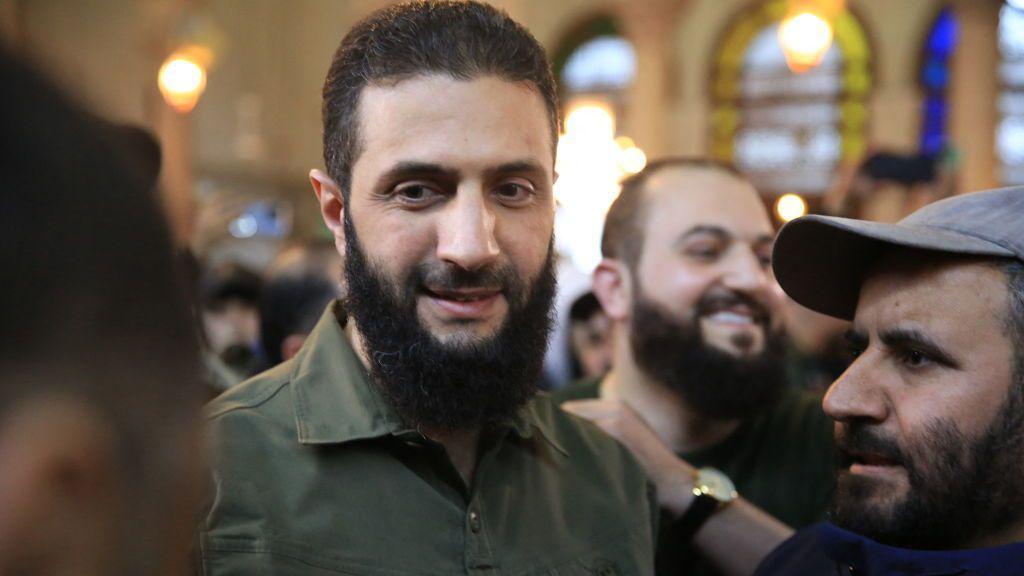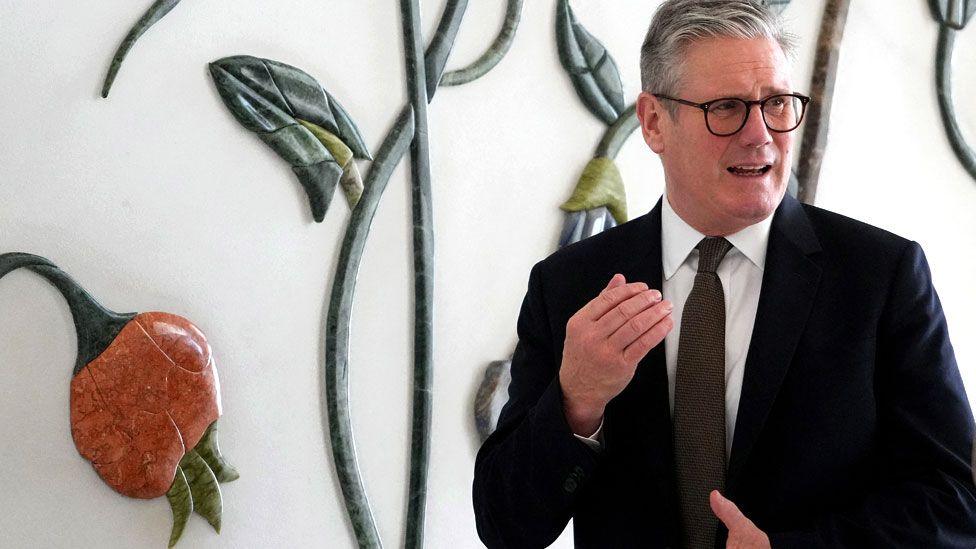Too early to remove Syrian rebels from terror list - Starmer

Abu Mohammed al-Jolani leads Syria's Islamist Hayat Tahrir al-Sham (HTS) group
- Published
Prime Minister Sir Keir Starmer says no decision has been made yet on whether the UK government could remove Hayat Tahrir al-Sham (HTS) from a list of banned terrorist groups after the rebels led the overthrow of Bashar al-Assad in Syria.
HTS was proscribed as a terror organisation in the UK after being added as an alias of al-Qaeda in 2017, meaning the UK cannot have any communication with the group.
Cabinet minister Pat McFadden earlier told the BBC that the UK could remove HTS from the list.
But Sir Keir said it was still "far too early" to consider a change of policy.
Speaking in Saudi Arabia, the prime minister said "we have to work to make sure that this is a peaceful opportunity" for Syria.
"We have all seen in other parts of history where we think there is a turning point - it turns out not necessarily to be the better future that we hope for," Sir Keir added.
"We've got to make sure this is different."
Separately, Foreign Secretary David Lammy told the Commons that the UK "will judge HTS by their actions, monitoring closely how they and other parties to this conflict treat all civilians in areas they control".
HTS and allied rebel factions seized control of the Syrian capital Damascus on Sunday after years of civil war.
Under the Terrorism Act 2000, the home secretary may proscribe an organisation if they believe it commits or participates in, prepares for, promotes or encourages, or is otherwise concerned in terrorism, and if it is proportionate to do so.
It is a criminal offence to join a group on the list. It is also against the law to arrange a meeting if it is to support the activities of a proscribed organisation.
HTS also faces sanctions from the US and UN due to its terror designation.
HTS leader Abu Mohammed al-Jolani, who has now started using his real name, Ahmed al-Sharaa, cut ties with al-Qaeda in 2016. He has recently pledged tolerance for different religious groups and communities.
Separately, the UK government announced an additional £11m of humanitarian aid to Syria.
The money will help "meet the needs of the most vulnerable across the country, including the more than 370,000 people estimated to have been displaced by recent events", it said in a statement.
On Monday morning, Cabinet Office Minister Pat McFadden told the BBC the situation in Syria was "very fluid" and if that stabilised, any change in the ban would be a "relatively swift decision".
When asked by BBC Radio 4's Today programme if a process to review HTS's designation as a terror group was under way, McFadden said: "Yes, obviously that's got to be considered. They've been proscribed for quite a long time now."
"The leader of that group has distanced himself in a way from some of the things that have been said in the past.
"He is saying some of the right things about the protection of minorities, about respecting people's rights. So we'll look at that in the days to come."
Former ex-head of MI6 Sir John Sawers told Sky News it would be "rather ridiculous" if the UK was unable to engage with HTS because of the ban.
Shadow foreign secretary Dame Priti Patel called on the government to review the "security and defence implications as well as the terrorist risks" posed by the rebel groups.
The UK closed its embassy in Damascus in 2013, two years after the Arab Spring protests began to be brutally suppressed there by the Assad regime. Even before that, relations were never as close as they are with, say, Saudi Arabia and the Gulf Arab states.
The UK and the US have a vital vested interest in preventing the resurgence of Islamic State (IS) or al-Qaeda in the sometimes lawless lands of northern Syria.
British citizens, in some cases the wives and children of IS fighters, remain in Kurdish-run prison camps in the north.
Meanwhile, the Home Office has paused decisions on Syrian asylum claims to the UK.
It is an insight into the fluidity of the situation in Syria, the multiple implications and the difficult decisions it poses – and will continue to pose.
Additional reporting by BBC security correspondent Frank Gardner and BBC political editor Chris Mason
Get in touch
How have you been personally affected by the recent events in Syria? Tell us your story.
Related topics
- Published8 December 2024
